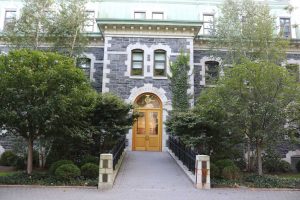By Jake Shore

Tuition at Fordham University is growing at its slowest pace in years, part of a nationwide trend in which U.S. colleges are now sharply curbing the annual rate at which tuition increases as the economy improves. This is a reversal after college enrollment and costs spiked in the country following the Great Recession in 2008.
Taking into account the price paid after financial aid, tuition for Fordham students rose 3.1 percent this school year, a decline from the 7.7 percent growth seen in 2008-2009, according to Fordham’s Vice President of Finance Nicholas Milowski.
First reported by The Wall Street Journal, Fordham’s slowdown fits into a trend across the country where U.S. colleges have been steadily reducing the rate of increase in their tuitions. Of potential college enrollees, the number of high school graduates in the country has shrunk from 18 percent from 2000 to 2010, to 2 percent in the last seven years, meaning a smaller pool of college applicants. For private schools specifically, prospective students are increasingly sensitive to high prices when choosing which school they will attend for the next four years, forcing universities to reconsider tuition costs and offer more financial aid.
Private universities like Fordham have been increasing how much aid they give to students. Of the 90 percent of freshmen who receive financial aid, almost 47 percent of their tuition was covered by Fordham, according to Milowski.
“In 2009, the average financial aid award per freshman was $12,183 and in 2018 is estimated to be $23,034, representing an 89 percent increase,” said Milowski
While private colleges like Fordham are giving more aid and slowing down the increase of tuition, the nationwide trend is going to hit for-profit institutions hardest, leaving universities like Fordham will endure, according to Professor of Economics at Fordham, Giacomo Santangelo.
Colleges like Fordham are unable to ratchet up tuition increases as quickly as they once did because the economy is markedly improved since the 2008 recession. During economic hardship and a declining job market, more people place an emphasis on attending school, which allows universities to raise the costs of tuition, according to an article in The Wall Street Journal by Josh Mitchell.
“When the economy is doing ‘well’ the job market improves and the choice of ‘going to school,’ versus ‘getting a job’ becomes difficult for students. Schools have to attract students,” said Santangelo in an email interview.
Mitchell said that exponential tuition increase is no longer the norm across the country, students have to take a harder look at the degree they are getting versus the debt they will be incurring from attending that university.
“For now, the shakeout is hitting private schools hardest. For-profit trade schools and many private nonprofit colleges are under pressure to justify high prices, particularly because some graduates are failing to land high-paying jobs,” wrote Mitchell.
Though tuition prices are no longer rising as fast as they did since 2009 at Fordham, Santangelo delivers a warning to prospective students and parents considering a four-year university like Fordham.
“I do not think people should become disillusioned and think that tuition are no longer increasing,” said Santangelo. “Tuition is still increasing at schools everywhere, it is only increasing more slowly.”








































































































































































































Sandy • Sep 30, 2017 at 3:09 am
Fordham is already ridiculously expensive for a school that ranks above 50th and offers limited program offerings especially in science. What you get at Fordham is Jesuit ramblings about how great they are or an adjunct prof, it is community college essentially with a huge wallop of social justice thrown in. Fordham embellishes beyond belief.